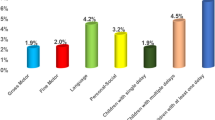Abstract
Objective
To evaluate the ability of ‘Ages and Stages Questionnaire’, a parent completed developmental screening questionnaire to detect developmental delay in Indian children.
Design
Cross-sectional study.
Setting
Child Development Clinic of a tertiary care center located in Northern India
Participants and Methods
200 children, 50 each in the age groups of 4±1, 10±1, 18±1 and 24±1 months were recruited (20 high risks and 30 low risks in each age group). The Ages and Stages Questionnaire (ASQ) was translated into Hindi and administered to the parents, followed by standardized development assessment using Developmental Assessment Scale for Indian Infants (DASII).
Results
102 (51%) children failed on ASQ and 90 (45%) children failed on DASII. The overall sensitivity of ASQ for detecting developmental delay was 83.3% and specificity was 75.4%. The sensitivity was best for the 24-months questionnaire (94.7%) and specificity was best for the 4-month questionnaire (86.4%). The sensitivity of ASQ was much higher in the high risk group (92.3%) as compared to the low risk group (60%).
Conclusion
ASQ has strong test characteristics for detecting developmental delay in Indian children, especially in high risk cases. It may be easily converted into other Indian languages and used widely for developmental screening.
Similar content being viewed by others
References
Glascoe FP, Byrne KE, Chang B Johnson KL, Chang B, Strickland B. Accuracy of Denver II in developmental screening. Pediatrics. 1992;89:1221–1225.
Knoblock H, Stevens F, Malone A, Ellison P, Risemberg H. The validity of parental reporting of infant development. Pediatrics. 1979;63:872.
Sonnander K. Parental development assessment of 18 month old children: reliability and predictive value. Dev Med Child Neurol. 1987;29:351.
Bartlett D, Piper M, Magill-Evans J, Warren S. Validity of mother’s assessment of infant motor development. Dev Med Child Neurol. 1992;Suppl 66:6.
Diamond KE. The role of parents’ observations and concerns in screening for developmental delay in young children. Topics in Early Childhood Special Education. 1993;13:68–81.
Glascoe FP, Sandler H. Value of parents’ estimates of children’s developmental ages. J Pediatr. 1995;127:831–835.
Glascoe FP. Parent’s concerns about children’s development: prescreening technique or screening test. Pediatrics. 1997;99:522–528.
Squires J, Brickers D, Potter L. Revision of a parent — completed developmental screening tool; Ages and Stages Questionnaire. J Pediatr Psychol. 1997;22:313–328.
Elbers J, Macnab A, McLeod E, Gagnon F. The Ages and Stages Questionnaire: feasibility of use as a screening tool for children in Canada. Can J Rural Med. 2008;13:9–14.
Rydz D, Srour M, Oskoui M, Marget N, Shiller M, Birnbaum R, et al. Screening for developmental delay in the setting of a community pediatric clinic: a prospective assessment of parent-report questionnaires. Pediatrics. 2006;118:e1178–e1186.
Gollenberg AL, Lynch CD, Jackson LW, McGuinness BM, Msall ME. Concurrent validity of the parent completed Ages and Stages Questionnaires, 2nd Ed with the Bayley Scale of Infant Development in a low-risk sample. Child Care Health Dev. 2010;36:485–490.
Skelleren CY, Rogers Y, O’Callaghan MJ. A parent — completed developmental questionnaire: follow up of expremature infants. J Paediatr Child Health. 2001;37:125–129.
Lindsay NM, Healy GN, Colditz PB, Lingwood BE. Use of the Ages and Stages Questionnaire to predict outcome after hypoxic-ischemic encephalopathy in the neonate. J Pediatr Child Health. 2008;44:590–595.
Bricker D, Squires J Ages and Stages Questionnaire (ASQ) — Second Edition. Baltimore, MD: Paul H. Brookes; 1999.
Phatak P. Developmental Assessment Scales for Indian Infants (DASII) — Revised Baroda Norms Manual, 1997.
Mukhopadhyay K, Malhi P, Mahajan R, Narang A. Neurodevelopmental and behavioral outcome of very low birth weight babies at corrected age of 2 years. Indian J Pediatr. 2010;77:963–967.
Taneja V, Sriram S, Beri RS, Sreenivas V, Aggarwal R, Kaur R. Not by bread alone’: impact of a structured 90- minute play session on development of children in an orphanage. Child Care Health Dev. 2002;28:95–100.
Kumar N, Shekhar C, Kumar P, Kundu AS. Kuppuswamy’s socioeconomic status scale-updating for 2007. Indian J Pediatr. 2007;74:1131–1132.
Author information
Authors and Affiliations
Corresponding author
Electronic supplementary material
Rights and permissions
About this article
Cite this article
Juneja, M., Mohanty, M., Jain, R. et al. Ages and stages questionnaire as a screening tool for developmental delay in Indian children. Indian Pediatr 49, 457–461 (2012). https://doi.org/10.1007/s13312-012-0074-9
Received:
Revised:
Accepted:
Published:
Issue Date:
DOI: https://doi.org/10.1007/s13312-012-0074-9




